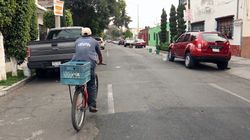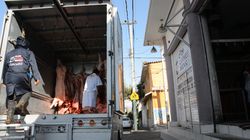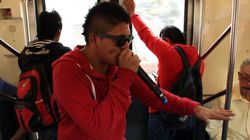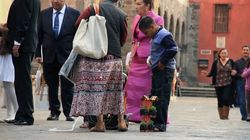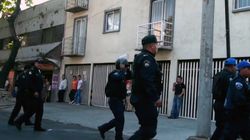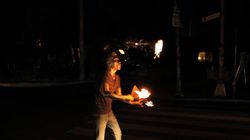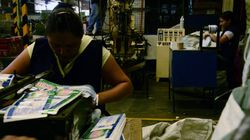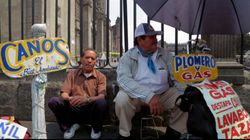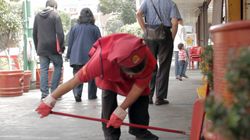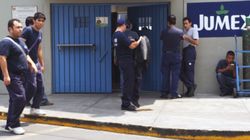Mexico City|Mexico
Statistical Data
Google entries for Mexico City, Ciudad de México
Ciudad de México Distrito Federal, México, D. F. 169.420.000
Google Entries per inhabitant (city) 19,04
Founding 1325
http://en.wikipedia.org/wiki/Mexico_City
POPULATION
City (2013) 8.893.742 [1]
Women 4.644.017 [1]
Men 4.249.725 [1]
Metropolitan Area (2010) 20,03 millionen [2]
[1] http://www.rincondegrandesbatallas.com/SEDECO/perfilDemografico_01edad.html
[2] http://en.wikipedia.org/wiki/Mexico_City
Population history
1750 131.000
1900 541.516
1930 1.229.576
1950 3.050.442
1970 6.874.165
1980 8.831.079
2000 8.591.309
http://de.wikipedia.org/wiki/Mexiko-Stadt#Einwohnerentwicklung
Area
City 1.485 km²
Metropolitan area 7.815 km²
http://de.wikipedia.org/wiki/Mexiko-Stadt
Population density (inhabitants / km²)
City 5.818
Metropolitan area 2.461
http://de.wikipedia.org/wiki/Mexiko-Stadt
CLIMATE DATA
Max. temperature Ø (°C) 23,4
Min. Temperature Ø (°C) 9,7
Rainfall / year (mm) 816,2
Rainfall / days 127
http://de.wikipedia.org/wiki/Mexiko-Stadt
Ethnic Composition (State, 2013)
Mestizos 60%
Indigenous 30%
Whites 9%
Others 1%
https://www.cia.gov/library/publications/the-world-factbook/geos/mx.html
Age Structure (City, 2014, estimated)
0-14 1.942.798
15-29 2.128.102
30-44 2.063.534
45-64 1.956.001
65+ 784.290
http://www.rincondegrandesbatallas.com/SEDECO/perfilDemografico_02proyecciones.html
Life expectancy at birth (city)
Women 78,04
Men 73,07
http://www.rincondegrandesbatallas.com/SEDECO/perfilDemografico_03demograficos.html
ECONOMY
GDP 2012
Metropolitan area 411,39 Mrd. USD [1]
Metropolitan area’s share of the national GDP 23,55% [1]
Share of the national GDP 17,83% [2]
GDP per Capita 9.940 USD [1]
[1] www.brookings.edu/~/media/Multimedia/Interactives/2013/tentraits/Mexico_City.pdf
[2] http://www.rincondegrandesbatallas.com/SEDECO/perfilDemografico_05riqueza.html
Employment by sectors (city area, 2012)
Agriculture 0,3%
Manufacturing 21,1%
Commerce / services 78,3%
http://www.inegi.org.mx/prod_serv/contenidos/espanol/bvinegi/productos/integracion/estd_perspect/df/Pers-df.pdf
Specific sectors share of the gross value added (2008, in%)
Services Distrito Federal 26,4 national 14
Finance and insurance Distrito Federal 34,4 national 8,3
Commerce Distrito Federal 10,8 national 12,4
Manufacturing Industry Distrito Federal 12,3 national 29,3
http://www.inegi.org.mx/prod_serv/contenidos/espanol/bvinegi/productos/integracion/estd_perspect/df/Pers-df.pdf
Number of companies per sector (City area, third quarter 2013)
Number % of all Companies
Construction industry 3.541 0,55%
Manufacturing industry 32.956 7,69%
Retail industry 193.096 45,04%
Storing and transport 3.541 0,83%
Finance and insurance 4.393 1,02%
Hotels / restaurants 45.066 10,51%
Services 57.939 13,51%
Social- / health services 19.052 4,44
http://www.rincondegrandesbatallas.com/SEDECO/empresas_02uEconomicas.html
Largest employers per sector (city area, 2008)
Services 41,2%
Finance and insurance 10,4%
Commerce 23,0%
Manufacturing Industry 12,3%
http://www.inegi.org.mx/prod_serv/contenidos/espanol/bvinegi/productos/integracion/estd_perspect/df/Pers-df.pdf
Unemployment rate (2013)
City 5,9%
http://www.rincondegrandesbatallas.com/SEDECO/empleo_02desempleo.html
Registered work places in the formal sector (October 2013)
City 2.917.272
http://www.rincondegrandesbatallas.com/SEDECO/empleo_03nuevos.html
Size of companies (Mexico, State)
Companies 3,7 million
Fewer than 5 employees 90%
Fewer than 10 employees 96%
More than 50 emloyees 1%
With health insurance 21,5%
http://mexicovoices.blogspot.de/2013/08/mexicos-informal-economy-one-reason-for.html
Informal Employment (2012)
Employees Mexico total 48,7 million [1]
Thereof informal employees 29,3 Mio = 60,1% [1]
Thereof income of 5 - 15 USD / day 70% [2]
Average income of informally employed people 0,65 USD / hour [1]
Rate in the Distrito federal (2010) ca. 55% [3]
[1] http://mexicovoices.blogspot.mx/2012/12/using-new-metric-inegi-finds-60-percent.html
[2] http://mexicovoices.blogspot.mx/2013/07/mexico-pena-nieto-presents-plan-to.html
[3] http://search.oecd.org/officialdocuments/publicdisplaydocumentpdf/?cote=ECO/WKP%282013%2935&docLanguage=En
COSTS OF LIVING
Prices (in EURO)
12 eggs 1,62,-
1 kg tomatoes 1,05,-
Bread for 2 people (1 day) 0,88,-
0,5 l beer in a supermarket 0,84
1 l milk 0,82
Hourly rate for cleaning help 3,86,-
Monthly rent for a 85 qm-
85 m2 apartment in an expensive area
of the city 1.087,00,-
1 l petrol 0,81,-
Monthly ticket public transport 14,00,-
http://www.expatistan.com
Loss of purchasing power of the wages since 1976 more than 70%
http://mexicovoices.blogspot.mx/2013/08/low-salaries-based-on-low-minimum-wage.html
In 1982 workers could buy, if desired, 51 kilos (over 112 pounds) of tortillas with a minimum wage. Today, they can only acquire 5 kilograms (11 pounds) [...] As part of the methodology of its research, the MAC [Center for Multidisciplinary Analysis in the Economic Research Institute at the National Autonomous University of Mexico] determined an amount that the minimum wage should be in order to fulfill what the Constitution decrees, and the results indicated that during the first quarter of 2013, this wage should be 189.7 pesos (about USD $15) and not 64.76 (about USD $5), as it is currently. This amount indicates only what a family could afford in nutritionally recommended foods for an average diet without considering other expenses like health, transportation, and education, explains this analysis.
http://mexicovoices.blogspot.de/2013/08/more-than-6-million-mexican-workers.html
Wages
Average income per year (Mexico, State)
Total population
2008 13.684 USD
2010 12.168 USD
Poorest families 2012 2.263 USD
Middle-class families 2012 7.738 USD
Richest families 2012 43.048 USD
http://mexicovoices.blogspot.de/2013/07/mexicos-wealthiest-families-earn.html
Minimum wage / median wage
Minimum wage (state, 2013, in the best paid Zone A) 5,1 USD / day
Median wage in informal work conditions 1,39 USD / hour
Median wage in formal work conditions 2,00 USD / hour
http://www.marketwatch.com/story/mexico-raises-minimum-wage-by-39-for-2013-2012-12-18-184851559
Fewer and fewer workers earn the minimum wage [...] That doesn’t mean that they’re well off, it just means that the minimum wage has gotten so far behind that it’s out of the labor market. (Rodrigo Negrete, National Statistics Institute)
http://www.marketwatch.com/story/mexico-raises-minimum-wage-by-39-for-2013-2012-12-18-184851559
Employees with minimal wages (Mexico, State)
Income 5 USD / day 6,25 million
Up to 10 USD /day 11,70 million
Up to 15 USD / day 9,90 million
Without fixed salary 3,50 million
http://mexicovoices.blogspot.de/2013/08/more-than-6-million-mexican-workers.html
Employees earning minimum wage, (City area, third quarter 2013)
Income 5 USD / day 10,0%
Up to 10 USD / day 21,4%
Up to 15 USD / day 18,5%
Up to 25 USD / day 16,0%
More than 25 USD / day 10,7%
No income / no data 23,3%
http://www.rincondegrandesbatallas.com/SEDECO/salariosIngresos_01poni.html
Comparison of wages in Mexico vs. China
Wages in the manufacturing industry 2002 237% higher than in China
Wages in the manufacturing industry 2012 7,3% higher than in China
http://mexicovoices.blogspot.de/2013/07/mexico-informal-and-temporary.html
POVERTY
Population in poverty (State, 2012)
2010 52,8 million = 46,1%
2012 53,3 million = 45,5%
The population in poverty is the one that has at least one social deprivation and receives an income below the wellbeing line, whose value is equivalent to the cost of the food and non-food baskets together.
http://www.coneval.gob.mx/Informes/COMUNICADOS_DE_PRENSA/2013/COMUNICADO_PRENSA_003_MEDICION_2012_ING.pdf
Explanation: Mexico follows a multi-dimensional approach in defining poverty, and - aside from the income situation it takes into account other poverty factors such as lack of education and medical treatment or lack of social security, insufficient living space, or insufficient quality or quantity of nutrition.
Population in extreme poverty (State, 2012)
2010 13 million = 11,3 %
2012 11,5 million = 9,8%
The people who have three or more social deprivations and earn an income below the minimum wellbeing line are considered to be in extreme poverty, that is, their total income is lower than the basic food basket cost.
http://www.coneval.gob.mx/Informes/COMUNICADOS_DE_PRENSA/2013/COMUNICADO_PRENSA_003_MEDICION_2012_ING.pdf
Coneval (Consejo National de la Evaluación de la Política de Desarrollo Social, National Council for the Evaluation of Social Development Policy) defines poverty as restricted access to three or more essential social services (education, healthcare, housing, social security, basic amenities, food), coupled with a monthly income below 2,329 pesos (1,490 pesos in rural areas, 1,125 and 800 respectively in the case of extreme poverty).
http://www.pulsamerica.co.uk/2013/08/08/mexican-society-and-culture-nearly-half-of-mexicans-below-poverty-line-coneval-study-reveals/
TRAFFIC
Cars (Metropolitan area)
Number, ca. 6 million (degree of motorization of ca. 300 cars per 1.000 inhibitants)
Daily new registrations 600
http://www.embarq.org/en/project/mexico-city-metrobus
The fleet of vehicles registered in Mexico City [Federal District] exceeds 3.5 million vehicles with another 4 million entering the city during the day, coming from the MMMex [metropolitan area] and from other federal entities. Thus it is estimated that the number of vehicles in circulation on the road net during the day is more than five million.
http://www.unhabitat.org/downloads/docs/GRHS.2013.Regional.Latin.America.and.Caribbean.pdf
Traffic indicators (2009)
Average time of travel by car 38 min.
Cars per street kilometre 354
Share of pedestrians and public transport 54%
CO2-Emission per capita / year 152,6kg
http://www.unhabitat.org/downloads/docs/GRHS.2013.Regional.Latin.America.and.Caribbean.pdf
Modal Split (Metropolitan area, 2007)
Cycling 1,0%
Private car 20,7%
Taxi 6,2%
Minivan 46,4%
Bus 9,8%
Metro 14,0%
http://cta.ornl.gov/TRBenergy/trb_documents/2012_presentations/187_Stokenberga_Explaining_Projecting.pdf
Pollution: days with ‚good’ air quality
1992 8
2008 181
2012 248
http://green.blogs.nytimes.com/2013/01/11/in-its-clean-air-marathon-mexsicko-city-turns-a-corner/?_r=0
Public Transport
Metro
Street net 225,9 km
Lines 12
Daily passengers 4,5 Mio.
http://en.wikipedia.org/wiki/Mexico_City#Public_transportation
This Friday, December 13, the Mexico City Metro becomes the most expensive in the world when adjusted for the national minimum wage. The 10 pesos, which comes out to about 78 US cents, for 2 tickets may not seem like a lot for some, but it points to the extremely low minimum wage in place in Mexico and the increasingly neoliberal policies being implemented by elected officials like Miguel Mancera, who was elected under a leftist banner and a promise not to raise Metro ticket prices.
http://thinkmexican.tumblr.com/post/69561224803/posmesalto-mexico-city-subway-fare-strike
Peseros (Micro buses)
Capacity ca. 22 seating places /50 seating- and standing places [1]
Amount (2007) 28.000 [1]
Other estimation 45.996 [2]
Daily passengers (2011) 12 Mio. [3]
[1] http://en.wikipedia.org/wiki/Pesero
[2] http://www.unhabitat.org/downloads/docs/GRHS.2013.Regional.Latin.America.and.Caribbean.pdf
[3] http://articles.latimes.com/2011/dec/09/world/la-fg-mexico-microbus-20111210
In the poor informal housing settlements on the outskirts of Mexico City – beyond the service jurisdiction of the city’s metro system – residents some times take two to three separate collectivos (shared-ride taxis and microbuses) to reach a metro terminal that provides low-cost connections to the city and job opportunities. 84 Travel can consume 25 per cent or more of daily wages. 85 Time costs can also be exorbitant: 20 per cent of workers in Mexico City spend more than three hours travelling to and from work each day.
http://www.unhabitat.org/downloads/docs/GRHS.2013.01.pdf
Metrobus (Bus-Rapid-Transit-System)
Installed since 2005 [1]
Lines 5 (1 further in preparation) [1]
Network 105 km [2]
Busses 367 [1]
Passengers 850.000 / day [1]
[1] http://en.wikipedia.org/wiki/Metrobús
[2] http://es.wikipedia.org/wiki/México,_D._F.
Positive Effekts due to the metrobus-system (2009)
Shortening of travel time along the routes 50%
Reduction of accidents 30%
Change from private car to public transport 6%
http://www.embarq.org/sites/default/files/Social-Environmental-Economic-Impacts-BRT-Bus-Rapid-Transit-EMBARQ.pdf
Yearly reduction of pollutants
CO2 -36.000t
Carbon monoxide -9.900t
Nitrous gases -209t
Fine particles -1,29t
http://en.wikipedia.org/wiki/Metrob%C3%BAs
UNIONS
Unions in Mexico are characterized by
– Fragmantation:
39 mergings and national organisations
in the private economy ca. 2.500 organisations
– Low standard of organisation:
10% of the labour force potencial / 2010: 13,92% of the employees [2]
4.6 bio. members (thereof more than 50% in the public sector)
http://www.fesmex.org/common/Documentos/Ponencias_Ind_Automotriz_Oct2013/TM_Political%20Context%20and%20Labor%20Relations.pptx
[2] http://www.google.de/url?sa=t&rct=j&q=&esrc=s&source=web&cd=4&ved=0CDwQFjAD&url=http%3A%2F%2Factrav-courses.itcilo.org%2Fen%2Fa3-56349%2Fa3-56349-resources%2Fselected-background-documents%2Filo_union-density-and-cb-coverage_irdata%2Fat_download%2Ffile&ei=sl2sUrW2Co3Fswb85IBg&usg=AFQjCNGkuJWu7yroUm3_Cn6fcSKcUo4BKg&bvm=bv.57967247,d.Yms&cad=rja
"Ghost Unions"
Labour laws in Mexico and the way they are applied by the government and employers result in collective agreements being reached at an enterprise between a "ghost" union (sin dicatos de papel) and an employer with no reference to the workers they cover. These agreements are known as protection contracts (contra tos de protección). [...] Protection contracts are not a small problem limited to a few isolated cases. Mexican labour lawyers estimate that the vast majority of all collective contracts concluded in Mexico are protection contracts. [...] When establishing a new enterprise, many companies conclude a protection contract with a "ghost" union before the first employee is even hired, effectively preventing employees from choosing the trade union of their preference. In most cases, these "ghost" unions belong to a corporate lawyer who has officially registered the union. These "ghost" unions are a legal simulation which defraud workers of their rights and represent a real obstacle to freedom of association. The "ghost" unions go on to make a profit and earn money from the unprotected workers with companies paying between 1 to 3.5 per cent of the workers’ salaries to the owners of this "ghost" union.
http://www.imfmetal.org/files/10033015240866/protection_contracts_-_an_introduction.pdf
Approximately 90% of collective bargaining agreements in Mexico are signed by protection unions.
http://www.usleap.org/usleap-campaigns/labor-rights-mexico
